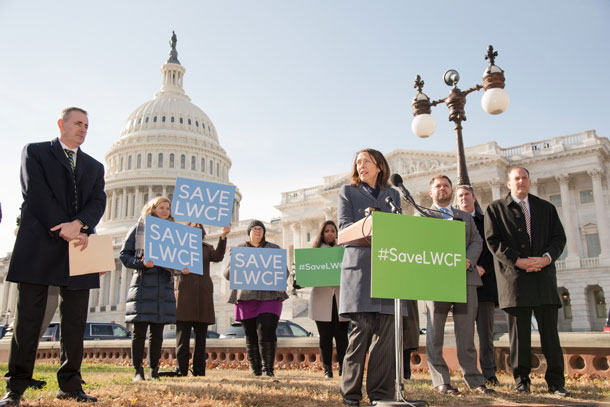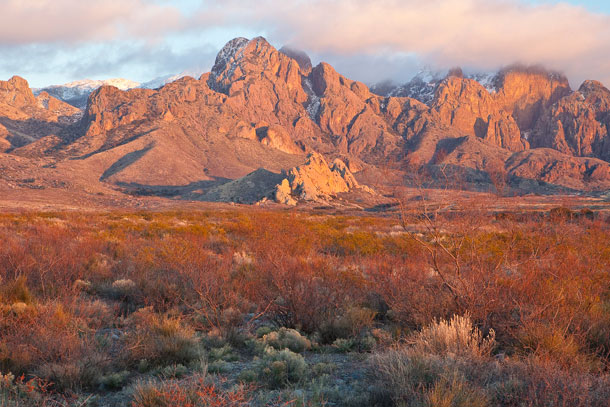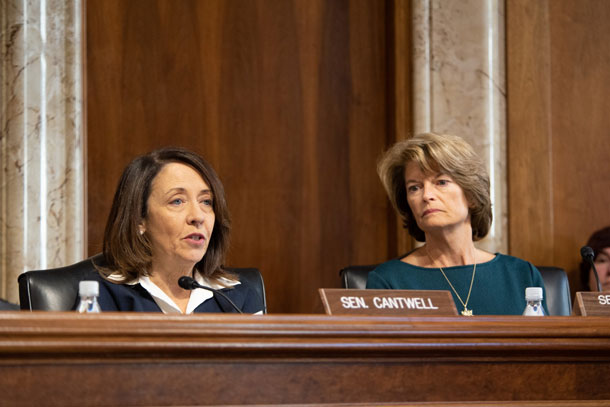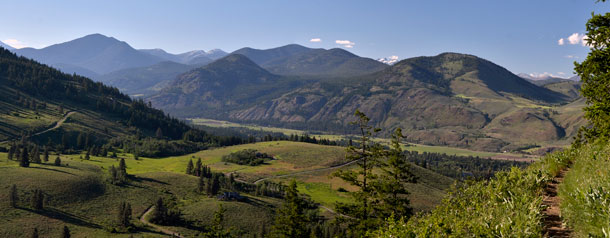Senate Passes Bipartisan Public Lands Bill
Air Date: Week of February 15, 2019

Senator Maria Cantwell spoke at a November 29, 2018 rally to save the Land and Water Conservation Fund, which Congress failed to reauthorize before its expiration on September 30th. (Photo: U.S. Senator Maria Cantwell)
92 Senators recently voted to pass the most sweeping land conservation bill in a decade. The legislation designates 1.3 million new acres of wilderness, five new national monuments, and hundreds of miles of wild and scenic rivers. It also permanently authorizes the Land and Water Conservation Fund, which uses fees from offshore oil and gas drilling to conserve public lands. Democratic Senator Maria Cantwell of Washington state cosponsored the bill and spoke with host Bobby Bascomb about what got this rare bipartisan effort across the finish line.
Transcript
BASCOMB: From PRI and the Jennifer and Ted Stanley Studios at the University of Massachusetts Boston, this is Living on Earth. I’m Bobby Bascomb, in for Steve Curwood.
In a rare bipartisan effort, the Senate has passed the most comprehensive conservation bill in a decade. The bill designates 1.3 million acres of new public land, five new national monuments, and hundreds of miles of wild and scenic rivers. It also permanently authorizes the Land and Water Conservation Fund, which uses fees from offshore oil and gas drilling to conserve public lands and water. Democratic Senator Maria Cantwell of Washington state cosponsored the bill and joins me now from Capitol Hill. Senator, welcome to Living on Earth!
CANTWELL: Thank you so much for having me on today.
BASCOMB: Senator Cantwell, I think congratulations are in order! You and your colleagues were able to pass a conservation bill, 92 to 8, in these highly partisan times. That seems like something of a miracle.
CANTWELL: Well, apparently Teddy Roosevelt's spirit is still alive and well in the United States Senate.
BASCOMB: [LAUGHS] I'd like to think so. What do you think got this bill over the finish line at a time when Washington seems so divided?
CANTWELL: Well, we came together around an important concept, which is the Land and Water Conservation Fund. It had expired in September, and members on both sides of the aisle thought that it was an important program that should be reauthorized. And we were able to get a coalition of members who believe in access to public land, to fight for a permanent reauthorization.
BASCOMB: Well let's unpack this a bit. What's in this bill in terms of additional protection for public lands?

The public lands package would add about 1.3 million acres of wilderness, including in New Mexico’s Organ Mountains. (Photo: Bob Wick / BLM California, Wikimedia Commons public domain)
CANTWELL: Well, the bill itself authorizes about 1.3 million new acres of wilderness. Those are in states like Utah and New Mexico and California. It creates more acreage of Wild and Scenic Rivers. And those are important tools to take some of the most pristine areas of our country and preserve them for continued access and recreational use. And then it also has mineral development withdrawals. For example, in my state of Washington, a very key recreation area called the Methow Valley, one of the most beautiful parts of our state, definitely didn't see itself consistent with mining and wanted the public lands withdrawn from mineral development. So those are the ways in which we can help local communities achieve their goals to have lands that are still pristine and accessible by so many people in the community.
BASCOMB: I understand that there's also a volcano early warning system involved here, which would affect you in your home state with Mount Rainier and Mount St. Helens. Can you tell me more about that?
CANTWELL: Yeah, the "Ring of Fire" that are these volcanoes across several states in the West, are real potential threats to us. We know that because of Mount St. Helens that blew up in 1980. So we want our scientists, our volcanologists to have the best information about these potential hazards. To do that, you actually need to have monitoring technology, and not all our volcanoes have that monitoring technology and they don't have real-time data for our geologists and scientists to evaluate. So this will make that investment in these areas. So whether you're in California, Oregon, Washington, Alaska, you will have that information.
BASCOMB: Can you tell me more please about what this bill provides in terms of preparing the nation for wildfire, especially in light of climate change and increasing wildfires in the future.
CANTWELL: Very good question. We have a wildfire management technology upgrade in this bill. Why? Because we're having so many more fire starts. We want the firefighters and their locations to be known at all times. And we want information about the fires to be real-time mapping. So we believe that pushing the Forest Service further on drone usage, as this bill will do, and a GPS system will literally give us situational awareness around the fires and fire starts. Once the firefighters are deployed and getting drone access, they literally can see where other fire starts are in the region. That real-time mapping is going to help us make firefighters safer. And it's also going to give us more data on where to deploy our resources. The second thing that it does, it's also going to use real-time technology information post-fire, to alert us on potential flooding. What happens after a fire, when so much vegetation is off of the land and rains come in, the impact of flooding can be quite significant, and mudslides. And what this real-time data from our NASA satellites will help us with is what are the immediate risks to those kinds of activities post-fire. And it also is putting resources into smoke forecasting. As we've seen in the last year, the amount of smoke now in our communities from fires as far away as Canada can impact communities greatly. And this gives additional resources for real-time information on smoke forecasting.
BASCOMB: Wow, well, they seem like really obvious and practical things to do.
CANTWELL: Well, that's what happens when you actually work together to pass legislation, you can get those things implemented. So we're very happy about that because we've definitely been impacted in the West and fire and we feel like the reason why we need to do public lands bills is because it's our job to manage that resource. And we want to use the latest and greatest technologies to help manage that resource. And so we feel that as climate does impact us across the United States, whether it is water, or fire, drought; we need to continue to upgrade our resources here federally to make sure that we are being good stewards of those lands.

Senators Maria Cantwell, left, and Lisa Murkowski, right, cosponsored the public lands bill and serve together on the Committee on Energy and Natural Resources. Senator Murkowski, the senior Senator from Alaska, chairs the committee. (Photo: U.S. Senator Maria Cantwell)
BASCOMB: Well, I have to tell you, for those of us that watch these issues pretty closely, it came as a surprise that so many of your colleagues were willing to sign on to this bill and in such a bipartisan way agree with you that conservation is something that you need to take very seriously at this point.
CANTWELL: Well, I think what happened is, there were definitely the naysayers who did want to dismantle or change the Land and Water Conservation Fund. But I think for my Western colleagues, many of them have seen this debate play out in their own states, and you have a coalition of people who have come together, whether it's cattlemen and bow hunters and fishermen and recreationalists, all come together and say, "No, this is for the public. These lands are for the public, and we want them to be preserved for the public use." You know, we do think we're going to come back and have another debate about funding the backlog and maintenance in our national parks, because there are ways to improve access to those parks. And we think we'll probably have conversations about making sure that the money from LWCF oil and gas royalties really does get spent on public lands instead of just going into the coffers of the federal government. But one thing's clear: this effort of ours to say that public lands are big economic impact and big business -- the outdoor economy is now third behind finance and healthcare as the third biggest sector -- that not only helped us get those votes, but my guess is will help us get future investments in public lands too from a financial perspective.
BASCOMB: And now, this bill comes on the heels of President Trump shrinking two national monuments in Utah, Bears Ears and Grand Staircase-Escalante. Those shrank by about 2 million acres. And that decision was basically to allow for mining in federally protected lands. Is this bill a rebuke of that type of environmental rollback from the Trump administration?
CANTWELL: Well, I think it's definitely a repudiation that public land should be reverted back to oil and gas development. When you have mineral withdrawals, and you have wilderness designations, I think it's definitely saying that we believe in public lands for the benefit of the public as opposed to special interests.
BASCOMB: What are the bill's prospects, do you think, for moving through the House and then being signed into law by the President?
CANTWELL: Well, we think they're very good, because we've worked with our colleagues in the House -- Congressman Grijalva, who is now the chairman of the committee and Congressman Bishop, who was the chairman prior to the Democrats taking over, and they both enthusiastically support this bill. So we're hoping it'll have easy House passage and that will get onto the President's desk very soon.
BASCOMB: Why is this issue so important to you? Why spend so much of your time on wilderness and public lands?
CANTWELL: Well, to me, personally, I'm a hiker and outdoors person. And I can just tell you, it's such a rewarding experience. And I see this in my own state, for veterans, for young schoolchildren, for the elderly, even, to get out into the beauty of the outdoors is really almost a spiritual thing. And the fact that we can give the American people use of their land for the public benefit is just a fabulous thing.

The public lands bill would make Washington state’s Methow Valley off-limits to mining. (Photo: Photo Journal, Flickr CC BY-NC-ND 2.0)
BASCOMB: Before you go, let me ask you about the Green New Deal, which was recently introduced to Congress. What is your take on that?
CANTWELL: I have to see what the resolution says, but I'm enthusiastic about the focus of a Green New Deal. We've been able to do a couple of things in the last decade. That is, increase the fuel efficiency of automobiles. We've been able to build out a smarter electricity grid, which is helping us on efficiency of all our energy uses. And we've been able to put tax incentives in place to fund more renewable energy instead of fossil fuel energy. And I want to keep that accomplishment going. I want us to double down on that, if you will. So I look forward to seeing the details of the resolution. I think it is just going to be introduced as a resolution. So we'll see what all of the provisions say, but the enthusiasm for more investments in conserving fossil fuels and switching over to renewables is a very good focus.
BASCOMB: Senator Maria Cantwell has served as a Democratic Senator from Washington State since 2001. Senator Cantwell, thank you so much for this time with me.
CANTWELL: Thank you, Bobby.
Links
AP | “Senate backs major public lands, conservation bill”
Read the full Senate Bill, the “Natural Resources Management Act”
Living on Earth wants to hear from you!
Living on Earth
62 Calef Highway, Suite 212
Lee, NH 03861
Telephone: 617-287-4121
E-mail: comments@loe.org
Newsletter [Click here]
Donate to Living on Earth!
Living on Earth is an independent media program and relies entirely on contributions from listeners and institutions supporting public service. Please donate now to preserve an independent environmental voice.
NewsletterLiving on Earth offers a weekly delivery of the show's rundown to your mailbox. Sign up for our newsletter today!
 Sailors For The Sea: Be the change you want to sea.
Sailors For The Sea: Be the change you want to sea.
 The Grantham Foundation for the Protection of the Environment: Committed to protecting and improving the health of the global environment.
The Grantham Foundation for the Protection of the Environment: Committed to protecting and improving the health of the global environment.
 Contribute to Living on Earth and receive, as our gift to you, an archival print of one of Mark Seth Lender's extraordinary wildlife photographs. Follow the link to see Mark's current collection of photographs.
Contribute to Living on Earth and receive, as our gift to you, an archival print of one of Mark Seth Lender's extraordinary wildlife photographs. Follow the link to see Mark's current collection of photographs.
 Buy a signed copy of Mark Seth Lender's book Smeagull the Seagull & support Living on Earth
Buy a signed copy of Mark Seth Lender's book Smeagull the Seagull & support Living on Earth

